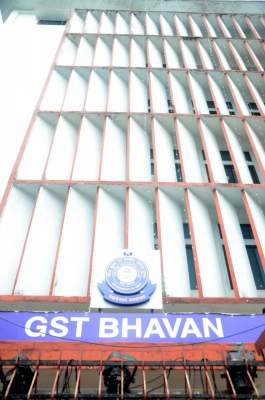New Delhi (IANS) As several states continue to oppose the borrowing options proposed in lieu of the GST compensation, the Centre has told states that central revenues have been under greater strain compared to GST revenue.
In a letter to the states, and Union Territories proposing the two options and explaining them in detail, the Finance Ministry also laid down the issues faced by the Centre in disbursing the compensation cess.
“The prevailing economic situation is such that Central revenues are under greater strain than GST revenue. While indirect taxes are linked to transactions, and recover in proportion to activity, direct taxes on profits are disproportionately reduced in the present situation,” it said in the 12-page letter.
Along with direct taxes on wages and salaries getting seriously affected, Customs revenues are also hit by the slowdown in imports, it said.
Central expenditures are stretched not only by the pandemic response but also by the needs of national security, the Finance Ministry stressed.
“This is a national problem, not a Central Government problem alone,” it said.
On the question of borrowing by the Union Government, to pay the compensation cess, the ministry said that the Centre already faces a very large borrowing requirement this year.
Further, additional borrowing by the Centre influences the yields on Central government securities (G-secs) and has other macro-economic repercussions, it said.
“The yield on G-secs acts as a benchmark for state borrowing as well as private sector borrowing. Hence any rise in Central borrowing costs ipso facto drives up borrowing costs for all borrowers, including not only the states but also the entire private sector,” the letter said.
As per the design of the options given to the states by the Centre to meet GST compensation gap, if the states decide to meet the entire shortfall of Rs 2,35,000 crores (including the Covid-impact portion) through issue of market debt, then additional unconditional borrowing limit of 0.5 per cent and the final (bonus) tranche of 0.5 per cent provided under the Atmanirbhar Bharat package as a Covid relief measure will not be available separately.
Under option one, the Centre has offered a special borrowing window to states, in consultation with the RBI, for an amount of Rs 97,000 crore (the shortfall arising out of GST implementation) at a “reasonable” interest rate.
The Centre will endeavour to keep the borrowing cost at or close to the G-sec yield, and in the event of the cost being higher, will bear the margin between G-secs and the average of State Development Loan yields up to 0.5 per cent (50 basis points) through a subsidy.
The second option given by the Centre allows states to borrow the entire projected GST compensation shortfall of Rs 2,35,000 crore (total shortfall of Rs 3 lakh crore minus Rs 65,000 crore collected as GST compensation cess) for FY21. But this borrowing will be allowed by subsuming the additional unconditional borrowing limit of 0.5 per cent and the final (bonus) tranche of 0.5 per cent given to states as a special limit to fight the Covid pandemic.
Though reform linked borrowing will be permitted under this option, it would not be carried forward to next year. The interest on borrowing taken by states under this option will have to be paid by them from their resources. The principal on the amount borrowed under the option, after the transition period, will be paid from the proceeds of the cess. The states will not be required to repay the principal from any other source.

